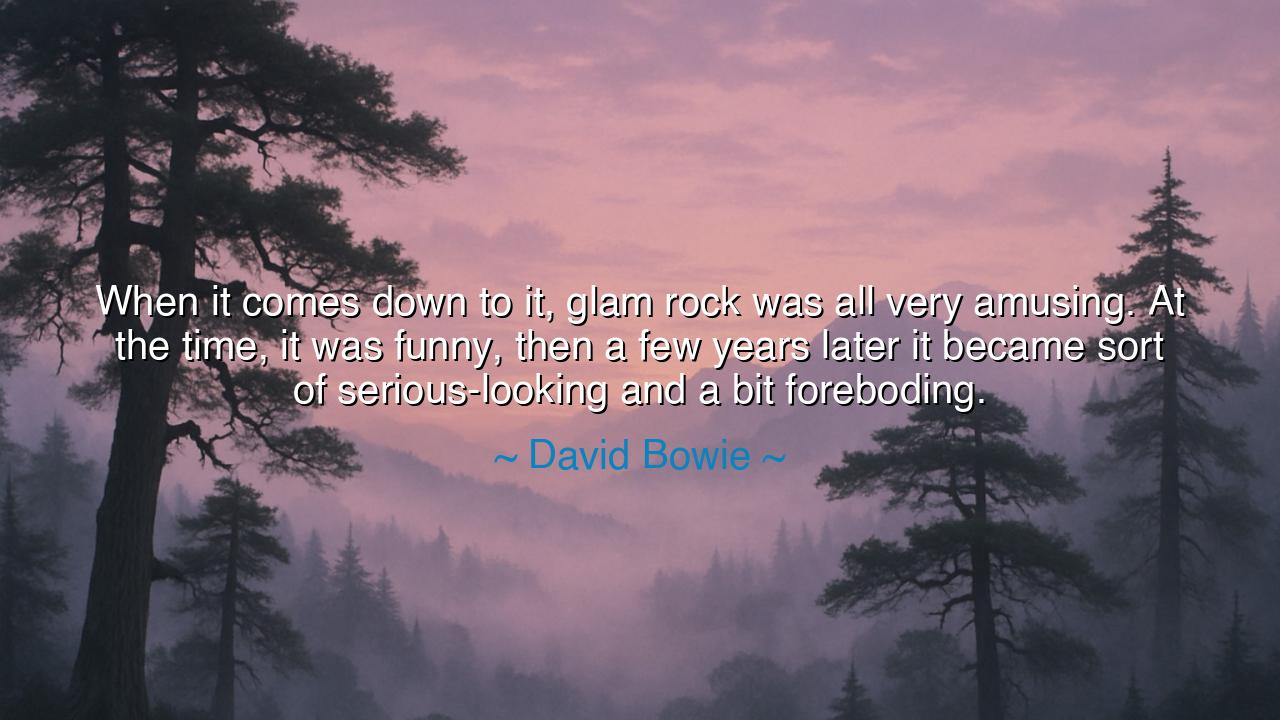
When it comes down to it, glam rock was all very amusing. At the
When it comes down to it, glam rock was all very amusing. At the time, it was funny, then a few years later it became sort of serious-looking and a bit foreboding.






Hear now the words of David Bowie, the chameleon of sound and soul, who once said: “When it comes down to it, glam rock was all very amusing. At the time, it was funny, then a few years later it became sort of serious-looking and a bit foreboding.” Though he spoke lightly, as if laughing at a memory, within these words lies a deeper reflection on art, illusion, and the passage of time. For Bowie, who both birthed and transcended glam rock, understood that what begins as joyful rebellion may, in the slow turning of the years, harden into symbol—beautiful, yet heavy with meaning that its creators never intended.
In his recollection, Bowie stands not only as a musician but as a witness to the transformations of culture. When he calls glam rock “amusing,” he remembers its origins as a celebration—a dazzling eruption of color and freedom in a world weighed down by conformity. It was the early 1970s, an era still echoing with the seriousness of war, politics, and protest. Into that tension burst the shimmering figures of Bowie’s generation—men in makeup, women in sequins, and all the in-between souls who dared to laugh at gender, power, and propriety. To be “amusing” in such a time was to be revolutionary. For laughter, as the ancients knew, can be a weapon sharper than any sword.
Yet, as Bowie observes, time transforms all things. The same glitter that once symbolized liberation began, years later, to take on a darker weight. What had been playful began to look “foreboding.” The masks and makeup, once tools of self-expression, came to reflect something deeper—perhaps even the loneliness behind the performance. This, too, is the nature of art: the creator begins with joy, but the world, in its hunger for meaning, reshapes the creation into myth. What begins as a joke may end as a prophecy. Bowie’s own alter ego, Ziggy Stardust, was such a creature—born from satire and spectacle, yet remembered as a tragic saint of alienation and fame.
This phenomenon is not unique to glam rock; it is the story of all human creation. Consider the myth of Icarus, who fashioned wings from wax and feather not to defy the gods, but to explore the joy of flight. His ascent was playful, his laughter bright against the sun. Yet over time, his fall became a symbol of hubris, warning rather than inspiration. The meaning of his act changed, just as glam rock’s did. What was once freedom became cautionary. Bowie’s reflection, then, is not only about music—it is about the alchemy of perception, how the mirth of one age becomes the melancholy of the next.
There is, too, humility in his tone. For Bowie—ever the shapeshifter—knew that artists rarely control how their work will be remembered. “At the time, it was funny,” he says, acknowledging that even the most daring movements are, in their birth, uncertain, fragile, and absurd. Yet to the eyes of history, they appear monumental, even ominous. The laughter fades, leaving only legend. This is the artist’s paradox: to create in joy, knowing that joy may someday be mistaken for gravity. In his words, there is no bitterness, only understanding. He knew that every cultural moment, no matter how bright, carries within it the shadow of reinterpretation.
From this reflection, a lesson emerges for all who create, lead, or live boldly: do not fear the laughter of the present, nor the judgment of the future. What seems foolish today may be sacred tomorrow; what feels serious now may someday be forgotten. The task is not to control meaning, but to express truth in its own time. For the spirit of glam rock—its color, irony, and freedom—was never about solemnity. It was about celebrating the self in all its contradictions. To live authentically, to dance in your own absurdity, is to create something eternal, whether or not others understand it.
Therefore, my children of art and transformation, take Bowie’s words as a gentle revelation: the laughter of the moment can become the legacy of the century. Do not fear to be “amusing,” for amusement is the seed of wonder. Let your creations, your actions, and your style reflect who you are, even if others mock or misunderstand. The world will always reinterpret you; let it. Your duty is to live truthfully, to create with joy, and to trust that time, in its strange wisdom, will reveal the deeper meaning. For as Bowie knew, all that glitters—though it may fade—leaves behind a trace of light for future souls to follow.
Thus remember the lesson of David Bowie and the age of glam rock: laughter is not the opposite of depth—it is its beginning. What begins in play may end in prophecy. What is bright today may darken with time, yet both shine with truth. So live as he did—fearlessly, artfully, and with a knowing smile—for the music of your spirit will echo long after the laughter fades.






AAdministratorAdministrator
Welcome, honored guests. Please leave a comment, we will respond soon